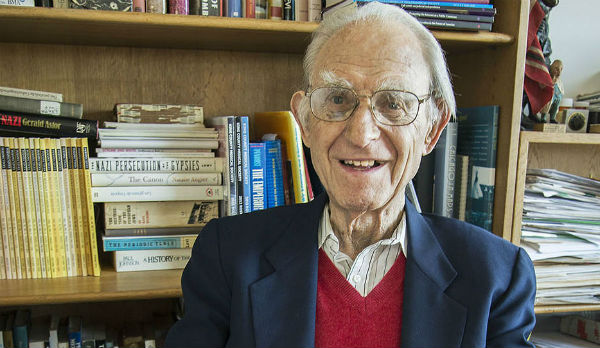
Photo of Dr. Motulsky courtesy of UW Medicine
Arno Motulsky, one of the founders of human medical genetics, died on January 17, 2018, at the age of 94 in Seattle (New York Times obituary, 1/29/18). I doubt his name is familiar to any of our current medical or graduate students, yet he pioneered studies of the genetics of heart disease, blood disorders, infections and immunity, variation in drug responses (pharmacogenetics) and other aspects of inherited disease. For this reason alone, he deserves to be remembered, but there is another reason as relevant to current events as are his research studies in medical genetics.
Arno Motulsky, his mother and two siblings first tried to enter the United States in June 1939, fleeing Nazi Germany aboard the German ocean liner MS St. Louis. The ship, carrying over 900 Jewish men, women and children, was first denied entry to Cuba and then was turned away from the U.S. off the coast of Miami. On the ship’s return to Europe, England, France, Holland and Belgium each accepted one quarter of the St. Louis’s passengers. Motulsky and his family were assigned to Belgium, but for the teenage Motulsky this led to confinement in a series of detention camps and a narrow escape from the Gestapo in the form of a visa to the U.S., which he reached in 1941.
Once in the U.S., he passed a high school equivalency test, worked days and took college courses at night and entered medical school at the University of Illinois. He was drafted into the Army, then finished his medical training before serving in the Army again at Walter Reed Medical Center during the Korean War. Following his discharge in 1953, he became an instructor at the new medical school of the University of Washington, and in 1957 became chief of its new Division of Medical Genetics. His legacy at UW includes not only his research studies, but also establishing Seattle as a major center for human genetics, and scientific progeny such as Mary Claire-King, who first identified a genetic cause of inherited breast cancer, and Joseph Goldstein, co-winner of the Nobel Prize for studies of familial hypercholesterolemia that led to the development of statins.
Why was the St. Louis denied entry to the U.S. despite the mortal danger of returning Motulsky and his fellow passengers to Europe? That is a question addressed by Sarah Stillman, a 2016 MacArthur Fellow, in a January 15, 2018, article in the New Yorker entitled “No Refuge.” The article details the stories of several undocumented immigrants seeking asylum in the U.S. whose deportation over the past few years amounts to a death sentence. In several recent cases, they have been deported without being asked by Customs Border Protection (CBP) officers about the potential physical danger to them of return to their home countries. The U.S. policy mandating such questions by CBP officers was a direct outgrowth of the treatment of refugees to the U.S. before and during WWII.
The MS St. Louis was built in 1928 for the Hamburg-American Line, and evidently named for the Missouri city. Is it a coincidence that the ship was named one year following Charles Lindbergh’s solo transatlantic flight in the single-engine Spirit of St. Louis? At a minimum, the correspondence between the name of the ship that was immortalized in the 1976 film Voyage of the Damned and that of Lindbergh’s famous plane is full of irony. Lindbergh was notoriously a Nazi sympathizer and spokesperson for the isolationist America First Committee. In his alternative-history novel The Plot Against America, Philip Roth describes events in the U.S. following the presidential election of 1940 in which Charles Lindbergh defeats Franklin Delano Roosevelt. Spoiler alert for those who have not yet read the book: It’s not a pretty picture.
All of which leads me back to Arno Motulsky. As the debate regarding our nation’s immigration policy rages once again, we would do well to recall the life story of a young boy whom this country spurned once, who narrowly escaped the fate of millions of Jews and others murdered by the Nazis and who, given the opportunity to enter the U.S., gave this country and the world the precious fruit of his brilliance and determination.


Comments on this entry are closed.
Extremely informative and timely article; thank you Allen.